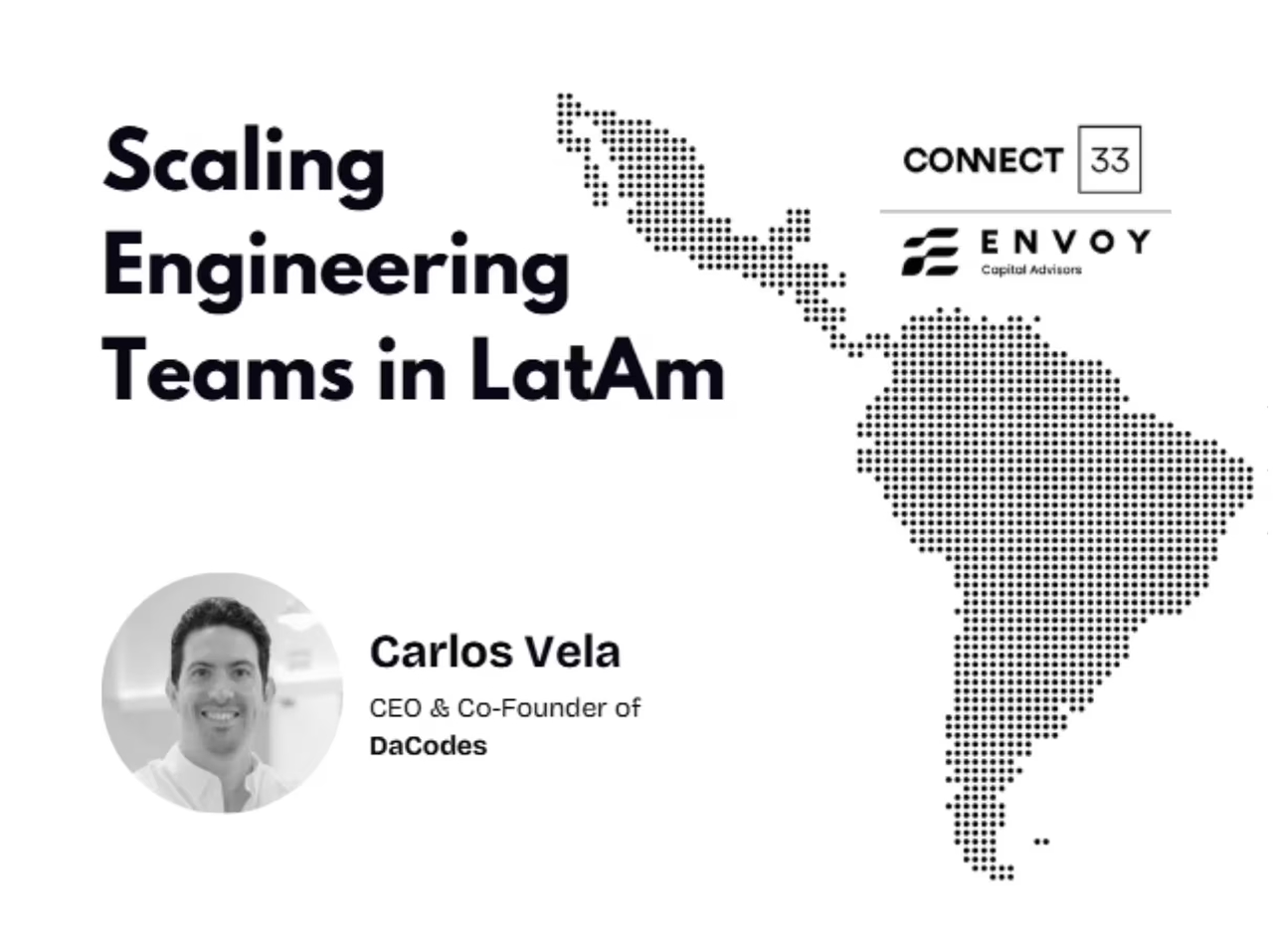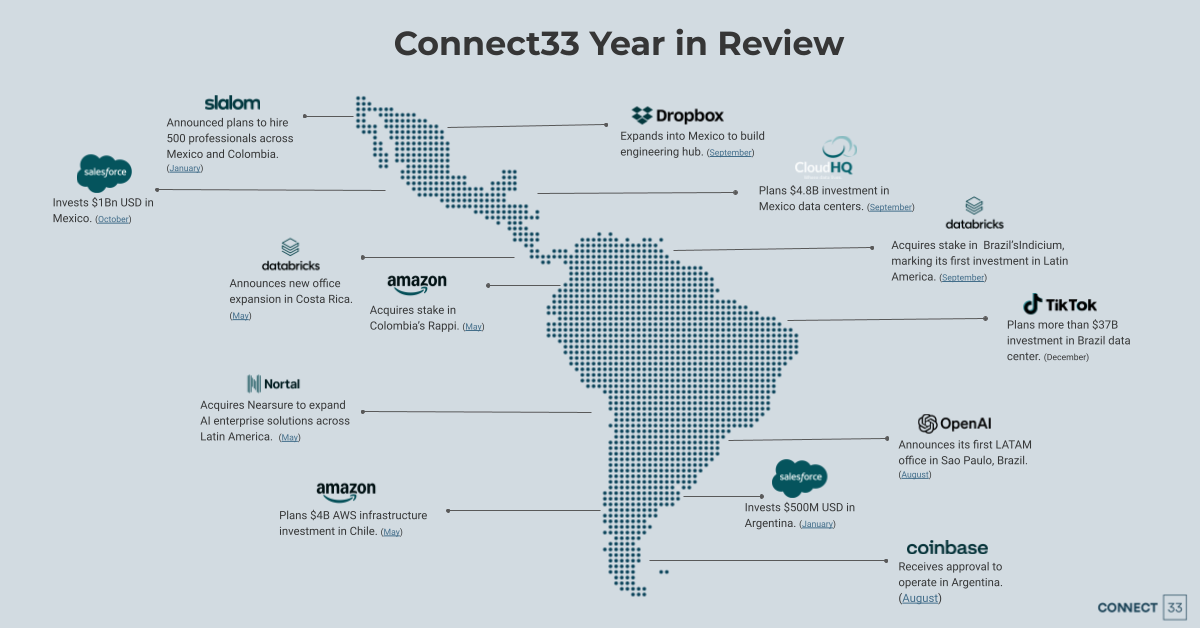Carlos Vela is the Co-Founder of DaCodes, a software development firm based in Merida, Yucatan, with 200 developers. DaCodes is one of the top software companies in the Southeast region of Mexico, helping bring software closer to people. The firm designs and codes top-tier digital products for enterprises, startups, and governments.
Q&A
Tell us the story of DaCodes.
We founded the company eleven years ago as a mobile development company. We were focused only on developing mobile apps. However, as you are aware, technology is constantly evolving, so we have transitioned from mobile apps to web development, to servers, to AWS, to the cloud, to AI, and various other technologies. Currently, we offer mainly two types of services. One is staff augmentation, in which we assign people directly to the client based on a rate card and seniority. The other is custom software development, where we develop software from scratch. The UX/UI design, workflows, and everything else are currently under our management. Currently, we have around 250 people working in the company. Most of them are developers, like 200.
We have experience working with various industries, including healthcare, fintech, sports, and retail. We can do almost everything right now, but we are currently developing some new capabilities. We are currently building an integration team. We are building our AI team. We are an AWS partner, so we work a lot with them to create a lot of, cloud workflows or workloads. Currently, we are growing, I believe. I believe that AI is currently a popular topic.
As a software firm, you need to be, you know, trying to keep pace with AI because every time AI is releasing new things. However, our goal for the next five years is to have 500 developers, increase our revenue, improve our gross margins, and expand our presence in the United States. Currently, I believe that half of our revenue comes from the US, and the other half from Mexico.
As you may notice, we are expanding in the US. We have two offices here, one in Houston and one in Scottsdale. We are striving to drive growth here in the US.
Can you tell us a bit about how the pandemic changed your business?
Yes. For us, it was more about the services. Before the COVID-19 pandemic, we were a custom software development firm. However, during COVID, we began to sell staffing services because, at least in Mexico, there was a surge in investment in various startups. So, they were like, 'I need developers right now, and I'm not able to hire them directly. So they started to ask for developers, for talent. And then before COVID, we were, like, I don't know, forty, fifty people. And after COVID, we are at 250 because staffing is a significant portion of our income right now, ~75%. So, at least from my perspective, it was more about the difference in the services that we were offering. And between LATAM and the US, it has always been the same. One problem we sometimes encounter is that to sell to US clients, you need to have developers with a strong command of the English language. That's the main challenge.
How are your teams incorporating AI into their staff augmentation processes? How are you thinking about it?
Regarding AI, we are an AWS partner. So, for example, AWS has just released an AI certification called AI Practitioner, in which you can learn about models, LLMs, and Amazon Backrock. That is a service that AWS provides to developers, enabling them to connect different services and build applications on top of AI. For example, we provide extensive training for developers and project managers.
We try to use ChatGPT to analyze RFPs, or we use Copilot to improve the code written by some developers. Sometimes you can improve the performance by two or three times. The time that the developer needs to develop something. So that's what I'm doing right now. We are also working with numerous clients utilizing GenAI. So, they have a problem within the company that they don't know how to solve using AI. So they come to us, and they, okay. Help me solve this kind of problem. Alternatively, we can build a chatbot, an AI automation, or something that provides value through GenAI. Currently, for us, GenAI is one of the most important initiatives we need to implement within the company, as we have 10 leads, for example. Half of them are about AI. And if you are not well-prepared, someone else will take that for you.
We are trying to, for example, hold weekly sessions with developers to discuss new trends and models. For example, with OpenAI, I have just released a new version of the API. How can we apply that to this client or to a client of a solution? We compare, okay. OpenAI has these advantages, but maybe Anthropic has disadvantages, and perhaps there are other factors, such as cloud or other considerations. Therefore, you should always strive to understand how AI is evolving.
Because every time you can see different new releases, and it is hard, you know, to maintain the pace with this kind of new solutions, not every day.
How are you encouraging your team of developers to learn AI?
I believe that developers recognize the need to learn about AI. Currently, it may not be entirely necessary for the job, but in one or two years, it will likely be a must. So we're trying to encourage them to learn new technologies. Even if the client is not willing to pay for it, we push hard because this is an investment for us. For us, it would be great to have 200 developers with extensive AI experience, as we can leverage that. You know?
It's expensive to hire someone with that level of AI expertise. For us, right now, it's about training. It's about training developers. It's about to implement AI solutions. And maybe at the beginning, we found some pushback; they didn't like to change the way they worked. However, they understand that this is the future right now. You know? Today, they have a job that may not exist in five years.
How do you think a broader change is coming to the model around custom software development? And will we transition to a more managed AI services model or a cost-saving model? Do you anticipate anything like that?
I think it's going to be a mix. For example, there is a new platform called Devlin that is being introduced to people. You have your junior AI developer in-house. Right?
You still need to tell the AI assistant what to do. So you need to have at least a couple of senior developers, a project manager, and a product owner. Therefore, for AI to build something from scratch without any assistance, it is a complex process. I think that we are, like, five years from that, or maybe more. I think that in the next couple of years, we may start to see a mix of AI as developer assistance, with more specific skills.
AI could develop, for example, the monkey work, while the senior developer would develop, for instance, the cloud infrastructure, or perhaps this is the entire solution, including the architecture. Or maybe the AI could work twenty-four hours a day for seven days, because it's a machine, you know, instead of only forty hours a week. That would be, I think, the right way to go, but still I don't know. Since AI is advancing rapidly, it's possible that this will happen next year.
I will not trust AI completely. For example, I think Devlin is facing some problems because they were trying to convince their clients that Devlin Juan could do anything. Yeah. Devlin could even push to production. However, what will happen is that if Devlin pushes something to production and the platform fails. Who are you gonna blame? The AI assistant? So, you need to be careful about where you implement AI.
Is DaCodes doing anything to reach the 500-employee target you're aiming for within the next five years? How are you positioning DaCodes to differentiate yourself from the major tech players entering the market?
First, we are trying to build these new capabilities. Right? As a software firm, you cannot say, 'I can do everything. However, if you have different capabilities, such as being an expert in building integrations or GenAI solutions with cloud services, I can sell those services. You know? It's going to be expensive because that's like you're an expert in that specific area.
I think that's one thing we're doing very well right now. Additionally, we are partnering with various clients. For example, we are developing a couple of AI projects in which we assist them in building the product. What we also try to do, as I can put it, is that they have a lot of AI engineers, and they are training our engineers with AI. You know? It's like a, I will give you this, and you will give me that. And that's great for us because it can sometimes be challenging to find AI engineers.
Or, to train them, you can sometimes see a job description. I'm seeking an AI engineer with 10 years of experience. AI is not ten years old, as in general, AI and similar concepts. So sometimes it's challenging to train, but you can, you know, ask for help from different companies that maybe have that expertise, and then they can help you. So I think that the capabilities are great.
I think we are trying to improve our recruitment process because, initially, we may have been more focused on filling a position, rather than finding the right candidate. However, we are currently looking for specific skills, as a senior developer is not necessarily about knowing how to code or being the best coder in the world. It's about soft skills. You need to have communication skills. You need to have leadership. You need to know how to effectively communicate your ideas to the client.
It's not about coding. That's something that AI cannot do right now. We are trying to improve various areas within the company to become a 500-developer company in five, five, or seven years. I don't know. That's our goal. But, yeah, it's hard to be Juan, but I think that we can do it. We are very confident that Tacos has considerable potential.
Do you think you would continue to do it all in Mexico, or would you consider another kind of nearshore geography? I know you mentioned that Houston is a hub for you as well. How are you thinking about that?
Yeah. Currently, we are working on establishing a sales team in the US. That is very important for us right now. We are currently hiring for two positions. Regarding engineers, I believe that approximately 75% of our engineers are based in Mexico, while we also have engineers in Argentina, Peru, and Colombia. We are open to hiring individuals from other countries.
Because of talent, you can find talent in any country. For us, Mexico is our base, but if I find someone in Argentina with strong English skills, solid AI expertise, and solid coding skills, I will hire that person. It doesn't matter if he is in Argentina or in Spain. We have developers in Spain. So Yeah. For us, talent is the most important thing right now.
What excites you about, you know, the next two to three years? Any particular projects that you have in your pipeline right now that you're really excited about, or your team is really excited about, and you know how you're going to continue capitalizing on that momentum that you're building now with expertise in-house?
AI. Yeah. For sure. Right now, we have a couple of projects that are very exciting for us. The first one is that we are working with a company that is building an SDK platform to connect various platforms through integrations. For example, you may want to connect QuickBooks with Google Sheets. They are building this SDK or platform to create these connectors, and we are collaborating with them to develop the connectors.
We have a referral program with them, where sometimes they don't want to build a specific connector. For example, let's say QuickBooks. So they will send us the client to build that connector for them. That is a specific solution that we have built, with approximately 100 connectors, something like that. And we are growing so fast with them because they are growing as well. Therefore, they lack the necessary engineers to construct the connectors. So they will say, hey. The coach, please help me with this 50 because I don't have time for this.
I'm focused on building the product, not the connectors. So that is an excellent business for us right now. And AI, for example, we are making this kind of investment in certain projects, where we sometimes partner with developers on the project because we believe in its potential.
So instead of, you know, charging x amount of dollars
For the developers, okay, give me that in equity because I believe that this project will be great, maybe in a couple of years. Obviously, folks are trying to focus their investment on AI projects. Because we are a services company. You know? Sometimes, I think, as you may know, it is difficult to scale because it depends on the number of people, clients, but maybe you can start building some products that will help you to scale, you know? Yeah. Investment or something like that. That's what we're trying to do right now.
And, yeah, like I said, I think that maybe half of the beliefs that we have right now are about AI. That means something: you need to be prepared. If not, then someone else will take your place and develop something for themselves. So, yeah, at least from my perspective, that's what we are doing right now.
There is a common misconception that the incentives of development shops and clients aren't aligned because the development shop's job is to continue charging the client. Have you found that cash or equity payments to be effective? Are there many clients receptive, or is this a particularly specific client?
First, we try to sell ourselves as a technology partner, not just a staffing company. That's something companies really like, or our clients. First, we don't invest in the project right away. First, we can bill you for the MVP for a period of six to eight months.
If we see that the project has a promising future, with investment backing it, the CEO or founder is a great person with a strong background, and we start to see this movement, then we can start discussing this type of investment. And most of the time, the client is the one who approaches and says, 'Okay, do you want to invest with me? ' Do you want to be part of this? Because I really like your work. I really like your developers.
Instead of charging me for the developers, I would like you to be part of my team. Perhaps we could do a mix. Okay. We have 10 developers with us. Okay. I will give you five with equity, and the other five, I will still charge you. For example, let's say something. That's the way it works for us right now.
We're not investing right away; we wait until we see something different, something that could make an impact, and then we'll start discussing whether to invest in this or that. It's not about us trying to reach the client to invest. They are coming because they need a technology partner, and they know that in the US, hiring another company would be more expensive. That doesn't make sense for them. They prefer to have a technology partner in Latin America with good expertise that could help them grow.




